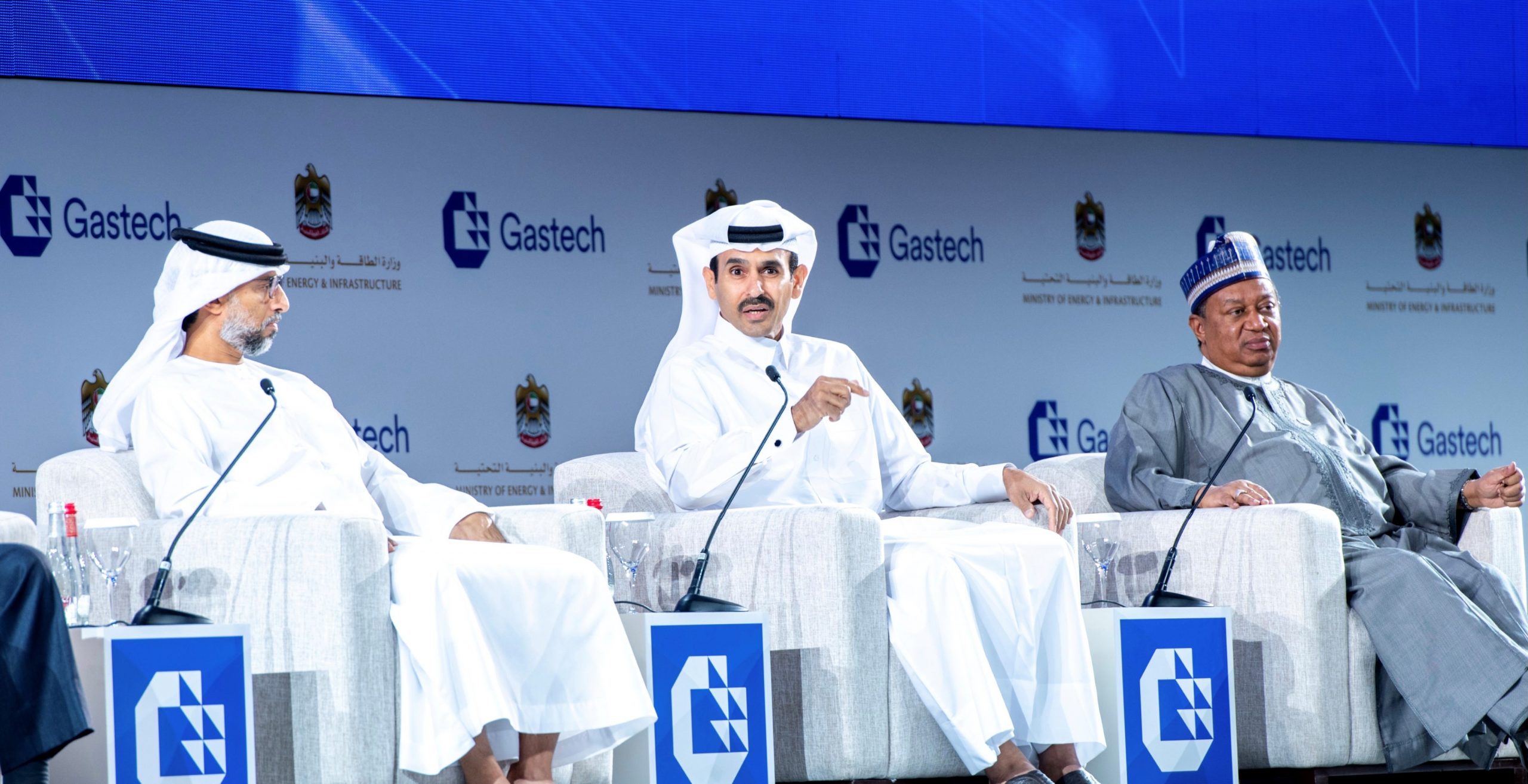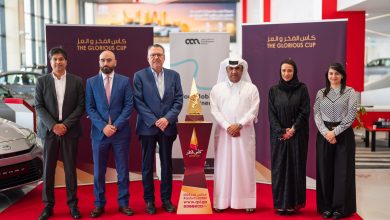‘Energy Transition is Shared Responsibility Requires Participation of Producers, Legislators and Governments’
“التحول إلى طاقة منخفضة الكربون يتطلب مشاركة المنتجين والحكومات والمستهلكين”
QNA
Doha: HE Minister of State for Energy Affairs, the President and CEO of Qatar Petroleum Eng. Saad bin Sherida Al Kaabi stressed that energy transition is a shared responsibility that requires the active participation of oil and gas producers, legislators and governments, and consumers across the globe, and should be driven in an equitable way.
HE the Minister of State for Energy Affairs made the remarks during the opening ministerial session of the Gastech Exhibition and Conference in Dubai to discuss driving the global energy transition, with the participation of the UAE Minister of Energy Suhail Mohamed Al Mazrouei, Turkeys Minister of Energy and Natural Resources Fatih Donmez, Indonesias Minister of Energy and Mineral Resources Arifin Tasrif, and OPECs Secretary General Mohammad Barkindo Sanusi.
In his remarks, HE Minister Al Kaabi noted that the energy transition is underway. “However,” His Excellency added, “we must all be cautious of the euphoria that is driving unrealistic rhetoric around the transition instead of tackling the issues that can be solved today.”
As an example, His Excellency highlighted that more than 30% of the worlds electricity is generated with coal today. He said: “By simply switching from coal to gas, we can cut the associated CO2 emissions by at least one half.” He also warned that pressuring producers into stopping oil and gas investments even for sustaining current production will have dire consequences, which can be felt severely by consumers.
In presenting his vision for an energy transition that leaves no one behind, HE Minister Al Kaabi said: “Lets not forget there are almost one billion people on our planet today that are deprived of basic electricity and fuels. Lets not forget them by only focusing on the richer countries and what they can afford and do.”
Citing the North Field Expansion project, which will raise Qatars LNG production from 77 million tons per annum (MTPA) to 126 MTPA, HE Minister Al Kaabi reaffirmed the State of Qatars commitment to investing in natural gas projects. He said: “This is our responsibility to the gas market and a big part of the transition journey we have embarked upon. We are adding four mega- LNG trains that have already been sanctioned and another two mega- trains will be sanctioned in the first quarter of next year.”
HE Minister Al Kaabi called on governments to assume their role in guiding energy transition by putting practical and pragmatic plans in place. He said: “Legislators and governments have a role to play. As an example, we do not have a consistent approach to carbon pricing or any other concrete mechanism that induces the right behavior towards energy transition. Many governments are calling for net-zero targets by 2050, but with no real plans or clear path to achieve that. This is not helpful to either governments or the public.”
His Excellency concluded his remarks by stressing that the oil and gas industry is part of the solution in the energy transition and fundamental to the growth of the global economy. “We have to join hands to make sure that this mammoth task that we are embarking on can be practically achieved. We need to collaborate and be realistic,” His Excellency added.
قنا
دبي: أكد سعادة المهندس سعد بن شريده الكعبي وزير الدولة لشؤون الطاقة، العضو المنتدب والرئيس التنفيذي لقطر للبترول، أن التحول إلى طاقة منخفضة الكربون هو مسؤولية مشتركة تتطلب مشاركة فاعلة من منتجي النفط والغاز، والحكومات، والمستهلكين حول العالم، وأن تتحقق بطريقة منصفة.
جاء ذلك خلال الجلسة الوزارية الافتتاحية يوم الأمس لمعرض ومؤتمر /غازتيك2021 / في دبي لمناقشة دفع عجلة التحول العالمي إلى طاقة منخفضة الكربون، وذلك بمشاركة السيد سهيل محمد المزروعي وزير الطاقة الإماراتي، والسيد فاتح دونماز وزير الطاقة والموارد الطبيعية التركي، والسيد عاريفين تصريف وزير الطاقة والثروة المعدنية الإندونيسي، والسيد محمد باركيندو سانوسي الأمين العام لمنظمة الدول المصدرة للنفط /أوبك/.
وأشار سعادة الوزير الكعبي في كلمته إلى أن التحول في الطاقة مستمر،” لكنه يجب علينا أن نحذر من النشوة المفرطة التي تدفع إلى مناقشات غير واقعية وغير منطقية حول التحول بدلا من التعامل مع القضايا التي يمكن إيجاد حلول لها اليوم”.
ولفت على سبيل المثال، إلى أن أكثر من 30% من الكهرباء حول العالم يتم توليدها اليوم باستخدام الفحم.
وقال: “سيؤدي التحول من الفحم إلى الغاز إلى خفض الانبعاثات الهائلة لثاني أكسيد الكربون إلى النصف على الأقل”، محذرا من أن الضغط على المنتجين لإيقاف استثمارات النفط والغاز حتى بهدف استدامة الإنتاج الحالي سيكون له عواقب وخيمة، يمكن أن يشعر بها المستهلكون بقوة.
وفي سياق عرض رؤيته لتحول إلى طاقة منخفضة الكربون لا يتخلّف عنه أحد، قال سعادته: “دعونا لا ننسى أن هناك ما يقرب من مليار شخص على كوبنا اليوم محرومون من الكهرباء والوقود. دعونا لا ننساهم بالحديث فقط عن البلدان الغنية وما يمكنها تحمّله وفعله”.
وأكد على التزام دولة قطر بالاستثمار في مشاريع الغاز الطبيعي، مستشهداً بمشروع توسعة حقل الشمال الذي سيرفع إنتاج دولة قطر من الغاز الطبيعي المسال من 77 مليون طن سنوياً حالياً إلى 126 مليون طن سنوياً.
وقال سعادته: “هذه مسؤوليتنا تجاه سوق الغاز وهي جزء كبير من رحلة التحول التي نقوم بها. نحن نعمل على إضافة أربعة خطوط إنتاج للغاز الطبيعي المسال تم الإعلان عنها سابقا لمشروع توسعة حقل الشمال، ثم خطين آخرين سيتم ترسية عطائهما في الربع الأول من العام المقبل”.
ودعا سعادة المهندس الكعبي الحكومات إلى تحمل مسؤولياتها في توجيه انتقال الطاقة من خلال وضع خطط عملية وقابلة للتحقيق. وقال: “للمشرّعين والحكومات دور يقومون به. فعلى سبيل المثال، نحن نفتقر إلى نهج متناسق لتسعير للكربون أو أي آلية تشجع على التعامل المناسب مع التحول. العديد من الحكومات تدعو إلى هدف “انبعاثات صفرية” بحلول عام 2050، لكن دون وجود خطط حقيقية لمسار واضح لتحقيق ذلك. هذا ليس مفيدا لكل من الحكومات والمواطنين”.
واختتم سعادته كلمته بالتأكيد على أن صناعة النفط والغاز هي جزء من الحل في التحول إلى طاقة منخفضة الكربون، وأنها أساسية لنمو الاقتصاد العالمي، مضيفاً: “علينا أن نتعاون جميعا لتجاوز هذه المهمة الكبيرة التي نحن بصددها بتحول يمكن تحقيقه عمليا. نحن بحاجة إلى المزيد من التعاون والواقعية”.




